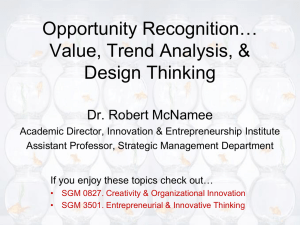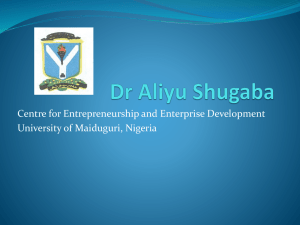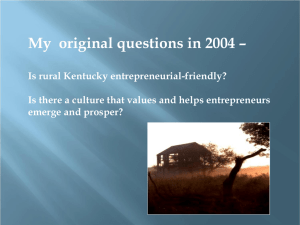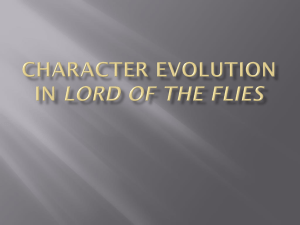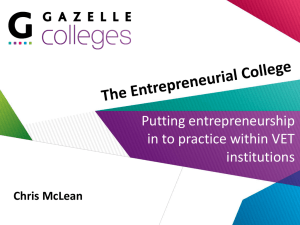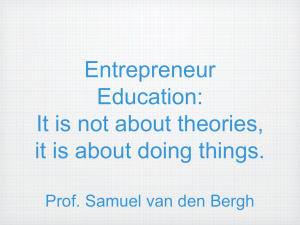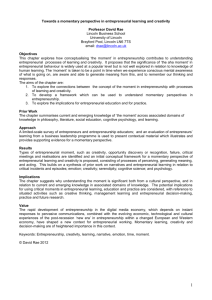moment
advertisement
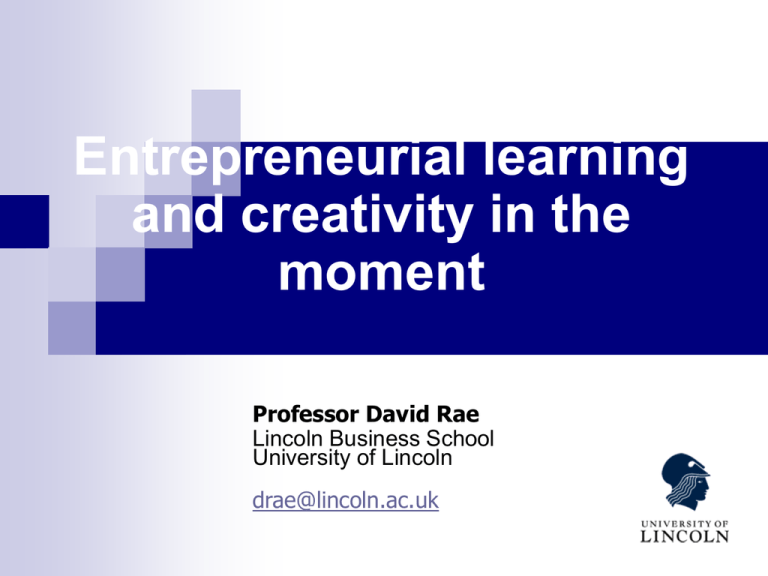
Entrepreneurial learning and creativity in the moment Professor David Rae Lincoln Business School University of Lincoln drae@lincoln.ac.uk Professor David Rae • Entrepreneurship researcher, educator & writer • Career in small business, government & higher education • Entrepreneurial learning: PhD & publications 1999-2012 • Director of Enterprise & Innovation, Lincoln Business School, University of Lincoln • Editor, International Journal of Entrepreneurial Behaviour & Research: ‘human & social dynamics of entrepreneurship’ • Optimist, based on human creativity & potential for learning davidrae.org.uk drae@lincoln.ac.uk ‘Warycat’ on Twitter Recall a ‘special moment’ Think back to a significant moment in your experience of life, learning or work This may be anything memorable for you: An event A meeting A conversation An idea A decision A good or bad experience Recall a ‘special moment’ Thinking of that significant moment…. What happened? How did you feel? What makes it special/memorable? How did it affect you subsequently? What did you do as a result? Share your story The ‘moment’: How Entrepreneurs learn A point in time when we experience conscious mental awareness of and create new business what is going on within our mind, or around us, and we are aware and able to remember our thinking and responses. opportunities Its meaning is related to the human experience and generation of meaning in a conscious attention span of subjective duration. Entrepreneurial Learning Moments: truth & lightbulbs…. Ernest Hemingway: The moment when the matador confronts the bull prior to the kill ‘momento de la verdad’ (‘Death in the Afternoon’) ‘Lightbulb’ or ‘aha’ moment: Conscious realisation of creative inspiration Why moments matter We focus much of the time on ‘the future’ or ‘the past’ Most decisions and actions happen ‘now’- often without time to think! We behave authentically in the moment: intuition & instinct The ‘aha’ or ‘Eureka’ discovery moment Recognising opportunities ‘Moments of truth’ - interactions, customers, competitors Value created & captured by digital eye-brain interactions: Twitter messages Website visits Email, social media, messaging Moments can become critical turning points in personal narratives of learning & identity ‘Momentary perspectives’ increasingly matter in understanding entrepreneurial opportunity recognition, behaviour & learning A range of theoretical perspectives on the moment… Philosophy & time: Bergson, James, Husserl, Adam Literature & narrative: Polkinghorne, Sartre, Ricoeur Education & learning: Pillemer, Giordano, Bedeian Cognition & neuroscience: Banks & Isham, Damasio, Beeman & Kounios Organisational studies: Czarniawska, Shotter, Weick Entrepreneurship: Cope, Rae, Dew, Krueger, Kollmann & Kuckertz These are examples from a wide field of knowledge Research framework Moment: ‘a point in time, an instant’; ‘a turning point in a series of events’. Q1: Is the moment significant in relation to processes of entrepreneurial learning and creativity? Q2: Can a useful model be developed to understand ‘momentary perspectives’ in entrepreneurial learning? Entrepreneurial learning Enterprise & entrepreneurship are increasingly prevalent at all educational levels but hard to ‘teach’. Entrepreneurial learning is a natural & social process within both everyday practice and formal education. Centred on creating, discovering, recognising and acting on opportunities. Connects personal emergence (confidence & identity) and capability development (skills & behaviours). Moments of serendipity, ‘discovery’, ‘crisis’ & ‘decision’ fit well with a naturalistic approach to entrepreneurial learning Enterprise and entrepreneurship education: Guidance for UK higher education providers Final version issued September 2012 http://www.qaa.ac.uk/Publications/InformationAndGuidance/Documents/enterprise-guidance.pdf Entrepreneurial effectiveness Research method Online survey of entrepreneurs & educators Questions Recall a ‘special moment’ from your experience This may be anything memorable, such as : An event, meeting, conversation An idea, seeing an opportunity, a decision A good or bad experience Can you remember what happened? What makes it special/memorable for you now? How did it affect you at the time? What did you do as a result? Share your ‘special moment’ Quick survey: types of moments reported by entrepreneurs S p e c ia l m o m e nts Discovery of new knowledge Social encounter Opportunity recognition Creative inspiration Problem or incident 0.0% 10.0% 20.0% 30.0% 40.0% 50.0% 60.0% 70.0% Common types of entrepreneurial moments Creativity Innovation Opportunity Problem Encounter Insight Intuition Judgement Resolution – inspirational association forming a new idea – application of idea to a practical situation – potential or actual position of advantage – disadvantage, mistake or setback – social interaction, meeting or social connection – realisation of new knowledge – ‘knowing’ at a subconscious or ‘gut’ level – making a decision or choice – intention to act Entrepreneurial moments & responses Creative Idea Inspiration Opportunity Problem Future possibility Innovation Incident! Encounter Discovery Social interaction New knowledge Meeting Learning Innovation Judgement! Emotion Feelings Positive: liking, pleasure, trust Negative: fear, dislike Cognition Add to/draw on memory New knowledge Learning Identity Being: who you are & aspire to be Narrative: story you tell Action Knowing what & how to act Behaviour Impact & selfawareness Generating meaning Perceiving Conscious attention Acting Subconscious awareness Conscious awareness in the moment Meaning Acting Perceiving Being in the moment Prospective imagination Experiential memory Future anticipations Past recollections Narrative time How do past experiences help make sense of the moment? Kairotic time: events Chronos time: linear What is likely to happen? What future possibilities & opportunities are there? What action can I take? Social interactions Talk Behaviours Subconscious Conscious Instinctive Intuitive Emotion Feeling Realisation Reflection Intention Meaning Acting Perceiving Sensory perceptions Being in the moment Visual, hearing, touch taste, smell Prospective imagination Experiential memory Future anticipations Past recollections Narrative time How do past experiences help make sense of the moment? Instant Deferred Verbal Physical Kairotic time: events Chronos time: linear What is likely to happen? What future possibilities & opportunities are there? What action can I take? Moments in teaching & learning Can educators create ‘special moments’? The value of learners reflecting on special moments & building these into their narratives: Enabling learners to capture, share, learn within & from special moments And to perceive, judge & act effectively in the moment? Using technology to share moments – twitter, blogs Building understanding of entrepreneurial behaviour through momentary perspectives Conclusions Momentary perspectives can offer new understandings of entrepreneurial learning behaviour, creativity, & transformative action Connects with philosophical & cognitive science perspectives ‘Moments of truth’ are often turning points in learners’ narrative accounts Unconscious processes of intuition, instinct & emotion are significant in creativity, decision-making & opportunity recognition behaviours Educators can elicit & use momentary perspectives in entrepreneurship education Comments & questions welcome….. Research paper available at: http://eprints.lincoln.ac.uk/7088/ Slides available from: drae@lincoln.ac.uk Entrepreneurial Learning

